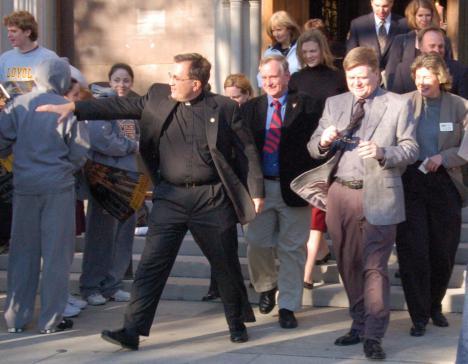Over the past several months, the Rev. Kevin Wildes, S.J., university president, has said the rebuilding and renewal of New Orleans won’t be quick or easy, comparing it to building a 19th century town from scratch.
His message to Loyola faculty at the spring convocation last Thursday about the future of the university echoed that sentiment.
While Loyola was spared any crippling physical damage, administrators are facing a multi-million dollar budget shortfall, the reality of a smaller student population and the challenge of trying to recruit on a national level at a time when the nation’s perception of New Orleans is tarnished.
Positioning the university for future growth will entail “profound challenges,” Wildes said. Loyola, however, is in a position to become stronger and better than before through new committees and task forces formed in the wake of Hurricane Katrina he added.
Loyola is heavily tuition-dependant – 72 percent of Loyola’s net revenue comes from tuition – and the challenge of retaining current students and attracting new students to avoid future budget shortfalls is on the minds of university officials.
“Right now, recruitment and enrollment are of deep concern,” Wildes said. “Enrollment drives everything for us.”
As of Tuesday, 90 percent of undergraduate students said they planned to return for the spring semester.
Loyola ranks 23 out of the 28 Jesuit universities in the country in regard to retention.
Administrators cut 76 staff positions at the end of December to ease the financial strain on the university. Because of Loyola’s financial structure, if not enough students return or if future freshman classes aren’t big enough, there is a possibility of additional layoffs, Wildes said.
“If we have lower enrollments in the future than we have been having, then we will be facing budgetary shortfalls,” Wildes said. “And unlike other companies, we can’t lower the cost of our operations.”
Most of the money Loyola spends is committed to salaries, Wildes said. According to Rhonda Cartwright, vice president for finance and administration, total salaries and benefits for Loyola were budgeted at $61.2 million.
In addition to protecting the enrollment figures, Wildes said another goal of his is to protect faculty members, especially young ones, whom he said are the future of the university.
In the event that the faculty may face cuts in the coming years, Wildes encouraged those who can to consider retirement or emeritus status, which would allow them to continue to be involved with Loyola while keeping the university in the black.
The coming years will lay the foundation for the future of the university, and Wildes is confident the right decisions will be made and Loyola will prosper.
“If I did not think there were positive possibilities for us as a university, or for the city and the region, frankly, I wouldn’t be here today.”
STUDENT CONVOCATION
Wildes said that while Loyola had returned in some capacity last year, “The silence [the lack of students] was deafening.”
Wildes welcomed back about 200 faculty, staff and students at the student convocation at Holy Name of Jesus Church on Friday, the day after the faculty convocation.
Student, faculty and administration representatives gave speeches about returning to Loyola and the importance of unity.
“Loyola is both place and people,” Wildes said. “We gather today to celebrate our return. We are here today to celebrate our coming together again as a community, a university in this place.”
Michelle Clarke, communications senior and SGA president, focused on what unites the university.
“The one thing that we all have in common and the one thing that brought all of us back is Loyola. Loyola means something different to each of us … now is the time to come together,” Clarke said.
The focus of this semester will not be simply coming together. It will include returning to normal activities and expanding upon activities that Loyola is known for. “We gather here to renew the commitment of Loyola University to the city whose name we bear. We don’t gather here just to be together. We gather to do our work better than we did before,” Wildes said.
John Murphy, professor of music, said, “The faculty is of the belief that you don’t want to attend Katrina University. Normalcy is what we should strive for in every way possible.”
Daniel Monteverde can be reached at dcmontev@loyno.edu.
Tara Templeton can be reached at tbtemple@loyno.edu.






